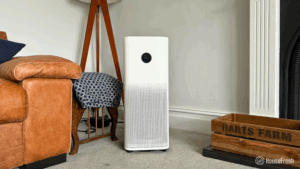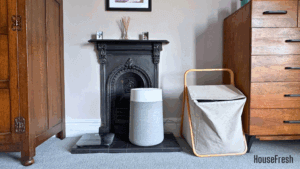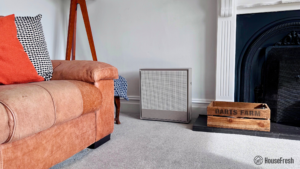Westinghouse was founded in 1886 by inventor George Westinghouse. Over the years, it has been involved in many markets, from nuclear power to buying the TV broadcaster CBS.
Today, many consumer products are created by Westinghouse – from commercial pressure washers to air purifiers. The Westinghouse 1804 is designed to be a portable air purifier with an onboard lithium-ion battery.
It’s relatively unique in the market as it combines a True HEPA filter with NCCO technology, a type of catalytic oxidation that, in lab tests, has been shown to reduce levels of VOCs.
The main competitors to the Westinghouse 1804 would be other portable air purifiers like the Smart Air QT3, Pure Zone Mini and the IQAir Atem.
- In our home lab of 728 cubic ft, we light an incense stick to generate particle pollution and VOCs.
- We set up our trusted Purpleair Indoor Sensor with the latest Bosch gas sensor to track levels of PM1ug/m3, PM2.5ug/m3 and PM10ug/m3 and VOCs in the air.

- We switch the air purifier to its highest speed and measure how long it takes to get our room air quality down to PM1 level to 0.
- For portable air purifiers, we repeat this test inside our Tesla Model 3 to see how good the unit is at cleaning the air in a small enclosed space.
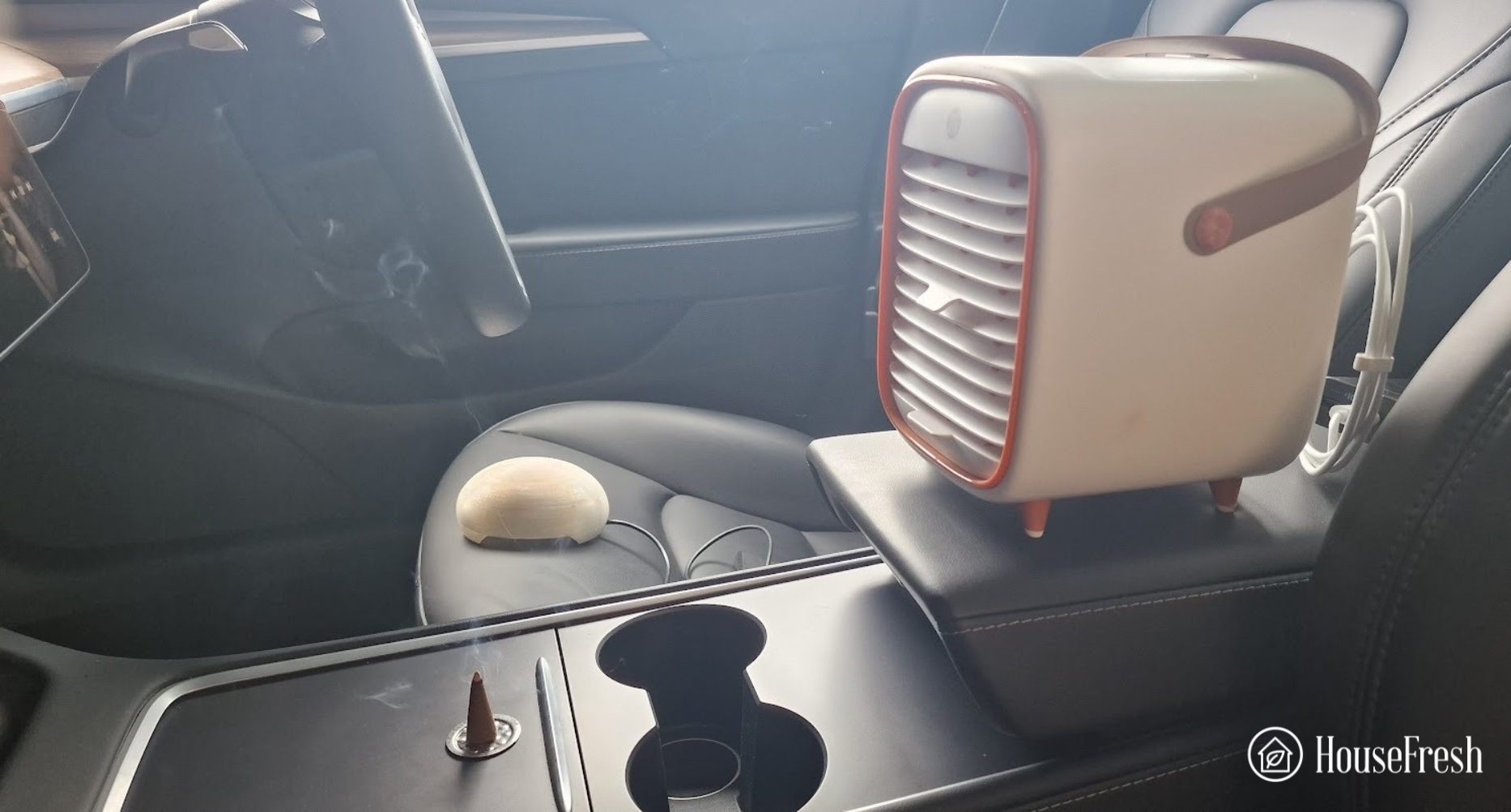
- We use an energy meter to measure precisely how much electricity is used when running the unit at the lowest and highest fan speed settings.

- We track sound levels emitted by the air purifier at different fan speeds with the help of a commercial sound meter.

We take our air purifier tests seriously and never recommend any models until we thoroughly evaluate them in our home lab.
Using our in-house test data means we can avoid the marketing jargon used by many air purifier brands and have a simple way to show consumers how well a device will perform in their home.
TL;DR The lowdown on the 1804


What we really like
What we think could be better
The specifications
Cost per CADR of $8.60 is higher than the Smart Air QT3 ($2) but less than the IQAir Atem ($10.23)
As we expect with a portable air purifier, this has a much lower CADR than we see with traditional designs used in the home. We expected it to perform less than the Atem or QT3 due to its lower CADR score.
This is the full breakdown:
| HouseFresh rating: | ★★★☆☆ |
| Time to clean our Tesla Model 3 (with the device running at top speed): | 47 minutes |
| Time to clean our 728 cubic feet test room (with the device running at top speed): | 4 hours and 40 minutes |
| Air purifier technology: | True HEPA and NCCO |
| Recommended room size (4.8 air changes per hour): | 23 sq. ft. |
| Clean air delivery rate (CADR): | Estimated: 15 CFM |
| Dimensions (in inches / in cm): | 6.3L x 6.3W x 3.5H inches ( 28.39 x 21.41 x 18.28 cm) |
| Weight (in pounds / in kg): | 2.12 lbs (0.96 kg) |
| Filter life: | 3-4 months |
| Noise level in decibels (measured from 3 ft. away with a sound level meter): | Speed 1: 36.7 dB Speed 2: 39.8 dB |
| Estimated running cost (electricity consumption + official filter replacement): | $27.81 per year |
| Cost per CADR cfm (based on dust CFM as reported by AHAM): | $0.37 |
| Manufacturer’s warranty: | 3 years |
| Country of manufacture: | China |
Easy to carry and simple design
The Westinghouse 1804 is a simple air purifier that is easy to carry around or keep in the car.

Weighing just one kilogram, the Westinghouse 1804 is light, small and easy to carry—the perfect combination for a portable air purifier.
The combination of white and cream colors with accent details in brown leather might not be everyone’s cup of tea, but it won’t stand out like a sore thumb in most vehicles.
If you’ve been browsing through portable air purifiers for a bit, you might recognize that the Smart Air QT3 shares the same color palette:
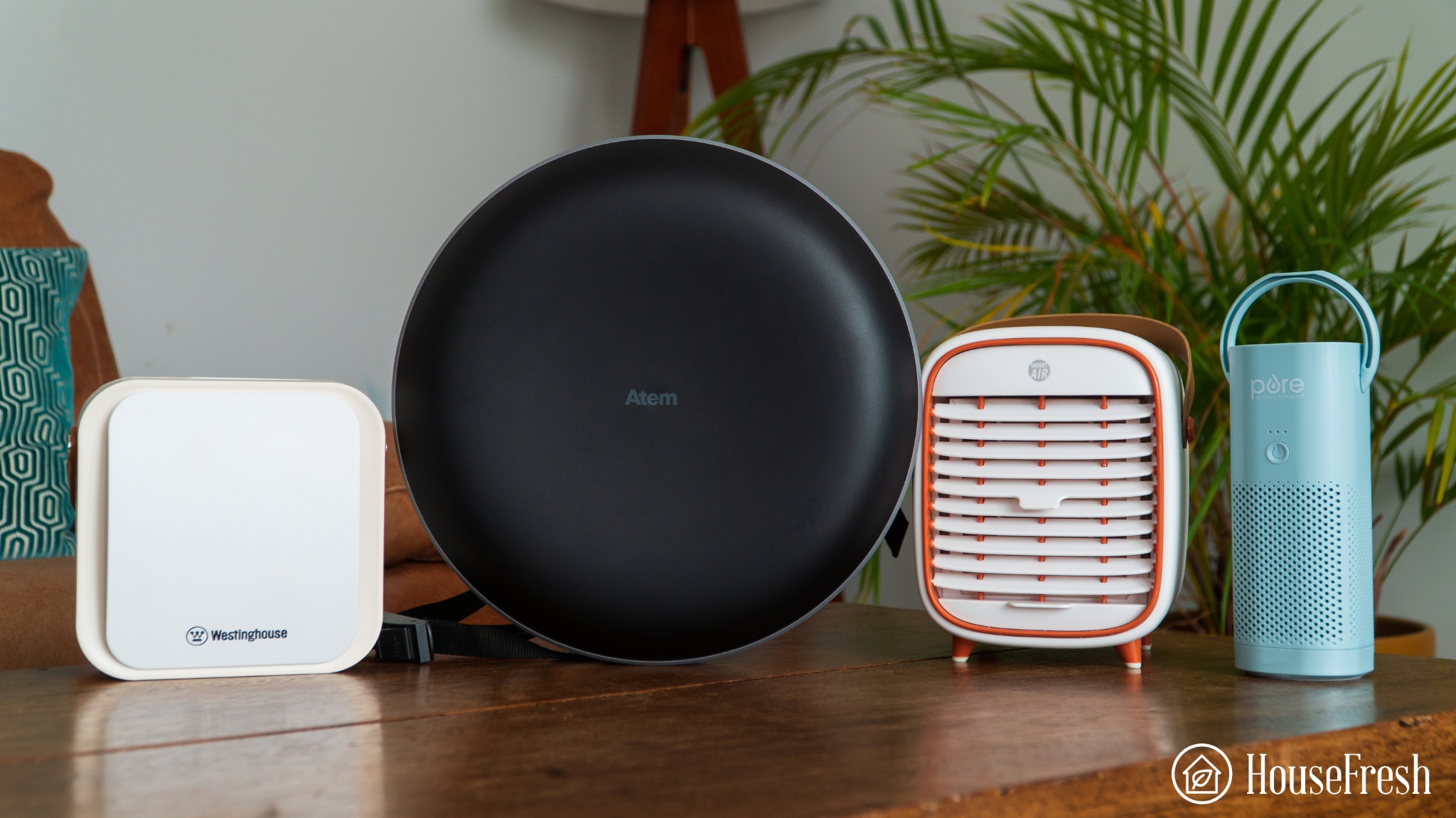
When comparing the Westinghouse 1804 with other car air purifiers we have tested, you will see that this unit blends into the group. It’s not as small as the PureZone Mini but it is definitely smaller than the QT3 and looks tiny compared to the IQAir Atem Car.
True HEPA and NCCO technology filtration
One of the standout features of the Westinghouse 1804 is that it uses a combination of True HEPA filtration with an NCCO reactor.

When you first receive the Westinghouse 1804, you will see that the True HEPA is wrapped in plastic, and the NCCO reactor is a foil wrapper.

Make sure to remove all the filter packaging; otherwise, the unit won’t work.
The True HEPA filter is pretty large, considering how small the Westinghouse 1804 is:

Upon closer inspection, I could see the True HEPA filter in the Westinghouse 1804 is of high quality, as one would expect from a big brand such as Westinghouse.
When it comes to replacing the filter, the process is pretty straightforward:
The one button on the right side makes removing the front case section easy. Once you open it, you can see the True HEPA first and then the NCCO zeolite filter behind it.

The Westinghouse 1804 is super easy to control as it only has one button that switches the unit on and then, with extra presses, changes the fan speed. It only has 2 fan speeds.

What is an NCCO reactor anyway?
I’ll be honest: when I first read the word ‘reactor’ after NCCO, I got slightly worried as it doesn’t sound safe at all.
Upon reading about it, I learned that NCCO stands for Nano Confined Catalytic Oxidation. NCCO technology uses ‘contained ozone’ in combination with zeolites (microporous, crystalline materials used as commercial adsorbents and catalysts) and other porous materials to decompose pollutants into water vapor and carbon dioxide.
When you open the NCCO reactor, we can see the Zeolite balls used in the NCCO process.

I didn’t like the mention of ozone, so I did some more research and found a study that states that there is no secondary pollution or re-release of pollutants in the NCCO process. This means that even though ozone is involved, and unlike ionizing technology, the Westinghouse 1804 shouldn’t be releasing ozone into the air.
This all sounds good, but I wanted to investigate further.
I noticed that the Westinghouse 1804 used special triangle screws to secure the front panel of the unit. Thanks to the magic of Amazon.com, I could obtain a set of specialized screwdrivers that allowed me to open up the Westinghouse 1804 so I could have a closer look under its hood to see what was hiding behind the front panel.

As soon as I removed the front panel, I could see the main fan, which is connected to the motherboard, 3200 mAH battery and a strange black box that seems to be part of the NCCO system.
Thanks to the magic of Google Lens, I identified this as a negative ion module, making me think that the Westinghouse’s NCCO reactor is just a zeolite filter combined with an old-fashioned ionizer function. Ionizers used to be super popular ten years ago but were pulled from the market as many units were found to release dangerous ozone levels.
This might explain why security bolts were used on the device, as this ionizer could generate high ozone levels if not enabled with the zeolite filter.
I used my ozone detector while running the Westinghouse 1804 inside my car and it didn’t take long for ozone levels to rise up to 0.3 ppb. This is a very low amount of ozone but it is not zero.

Of course, it is way lower than the 50 ppb threshold set in order to achieve a CARB certification, which the Westinghouse 1804 has.
I am disappointed to see the use of an ionizer and more so from their lack of openness about this with references to NCCO.
The 1804 cleared our TeslaModel 3 in 47 minutes
As we have been doing portable air purifier tests, we have been using our Tesla Model 3, creating incense smoke and then measuring how long each air purifier takes to remove all PM1ug/m3 pollutants.

The Tesla Model 3 has a reasonably small cabin with around 97 cubic feet of volume. Similar to our home lab tests, we used the industrial grade sensor in the Purpleair Indoor sensor to continuously track levels of PM1.0ug/m3, PM2.5ug/m3 and PM10.0 ug/m.
You can see our data below:
Air cleaning performance test results
With a CADR of 15 CFM, I was expecting it to perform to be a little better than the Pure Zone Mini, which has a CADR of 10 CFM, but I was surprised to see it perform as well as the QT3 and only 10 minutes slower than the $400 IQAir Atem.
Combining the ionizer “NCCO” and true HEPA allows it to remove pollutants much quicker than we would assume, going off the reported CADR scores alone.
While I was disappointed that the Westinghouse 1804 uses an ionizer, I can’t disagree that it performed well at removing pollutants in the car.
Noise levels test results
One area of the Westinghouse 1804 that stands out is the low level of sound used, with a maximum of 39.8 dB. This is similar to what we see with other brands that use ionizers like Blueair, as they can run the fan lower but clean the air more efficiently due to the use of an ionizer.
The Westinghouse performed well when compared with other portable units.
Sound can be very subjective, so we created a video of the Westinghouse 1804 running at both its fan speeds.
The cost to run a 1804: $27.81 per year
1. Electricity costs = $3.81
As we expect with a portable air purifier, the Westinghouse 1804 doesn’t use much energy, with 2.5 watts pulled at its highest speed.
2. Filter costs = $24
While the True HEPA filter replacements only cost $8 each, you need to change them every 4 months. You can even get the price down to $5 if you use generic filters.
This is much less than the IQAir Atem Car and just a little less than what we see with the Smart Air QT3.
When comparing the costs associated with running the Westinghouse 1804 with other portable air purifiers, it is clear that the 1804 is the most cost-efficient unit:
Bottom line
The Westinghouse 1804 is a powerful and cheap portable air purifier, but I do worry about the use of an ionizer.

At $129, the Westinghouse 1804 is cheap, especially compared to the $400 IQAir Atem Car. It performed well in our test to remove pollutants from our Tesla Model 3, but I am concerned about the use of an ionizer.
If you don’t worry too much about the ionizer and are happy to get better performance for a reasonable price, then the Westinghouse 1804 is worth a look.
But for most people, we would recommend the Smart Air QT3 as it’s cheaper to buy and has the same level of performance with zero risks of chemical by-products.
SOURCES
We calculated yearly costs associated with running the Westinghouse 1804 24 hours a day, 365 days per year utilizing the latest average energy prices as reported by the Bureau of Labor Statistics of $0.174/kWh as of May 2024.


